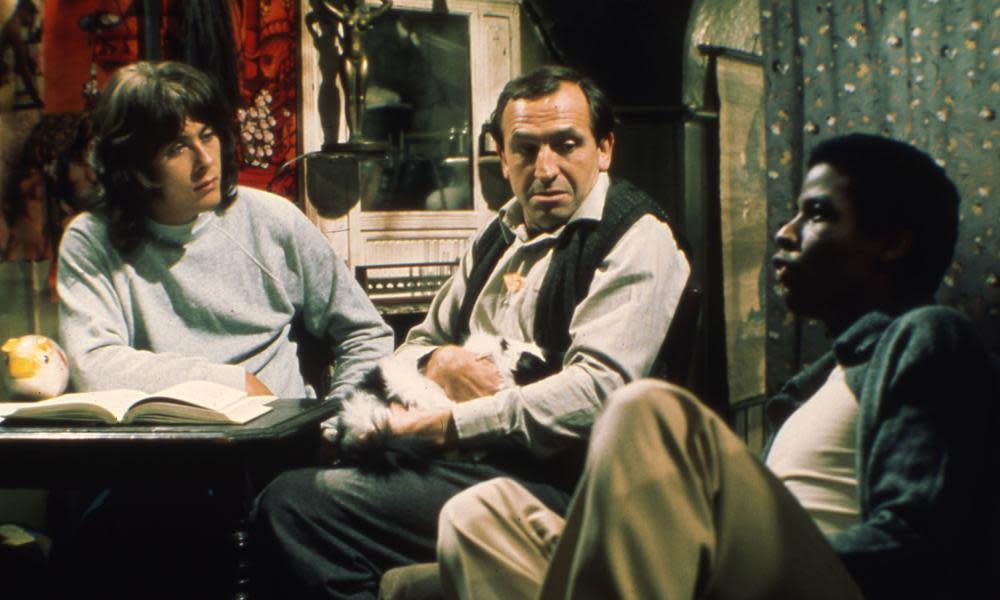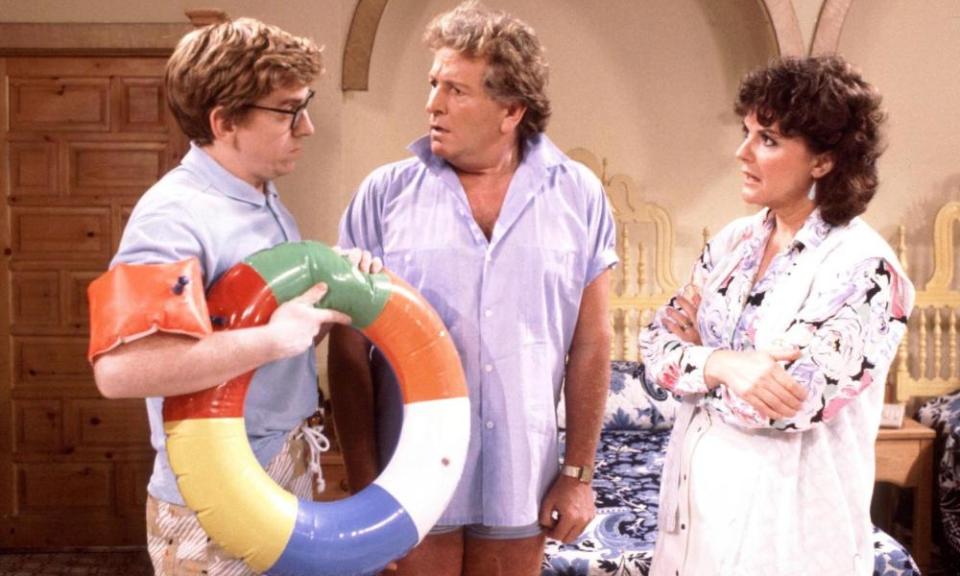Eric Chappell obituary

Writer of Rising Damp, The Bounder, Duty Free and other successful television sitcoms
Although he wrote several popular television sitcom series in the 1980s, Eric Chappell, who has died aged 88, was best known for his first success, Rising Damp (1974-78), produced at Yorkshire Television and starring Leonard Rossiter as the overweening, lecherous landlord Rupert Rigsby and Frances de la Tour as one of his lodgers, Ruth Jones, in a northern university town.
Also in the cast, Richard Beckinsale, as the long-haired, borderline angelic medical student Alan Moore, and Don Warrington, as the cool and composed Philip Smith (son, he said, of an African prince), brought a further depth to the comic acting.
Its quality was a result not just of Chappell’s excellent scripts – he had a gift for writing dialogue in extended comic scenes – but also the theatrical origins of the series. Chappell, who had worked as an auditor for the East Midlands Electricity Board for 22 years, was an unpublished novelist who decided to try his luck in the theatre, because a play meant writing 20,000 words, as opposed to the 70,000-word minimum for a novel.

On a whim, he sent his play, The Banana Box, to an agent at Curtis Brown because he had read, and admired, the plays of RC Sherriff (author of the first world war hit Journey’s End), who was a client of that agency. There was a reading of the play, then a premiere at the Phoenix theatre in Leicester in 1971, with Wilfrid Brambell (the senior, salivating rag-and-bone man in Steptoe and Son) in the landlord role, followed by an Oxford Playhouse touring production by David Scase.
This version landed at the Hampstead Theatre Club in London in May 1973 – the text was published in Plays and Players magazine – with Rossiter, De la Tour (replacing Rosemary Leach, who had played Miss Jones), Warrington and Paul Jones – then prominent as a blues singer with Manfred Mann – as the medical student.
It then transferred to the Apollo theatre for a six-week run as the television pilot was commissioned and Beckinsale replaced Jones. The BBC had allegedly declined to take up an option because Chappell’s script contained “too many jokes”.
The landlord as played by Brambell had been called Rooksby, but a real-life landlord of that name objected to being represented on stage by such a scrofulous toe-rag and the name was changed to Rigsby. It was undoubtedly Rossiter’s turbo-charged, manic and physically extraordinary performance that propelled the huge success of the TV series, and indeed its continuing popularity. Joe McGrath’s 1980 film, with Christopher Strauli replacing Beckinsale, who had died tragically young in 1979, was a severe disappointment, but Rising Damp lives on in those endless repeats.
Chappell became a full-time writer and embarked on a prolific career. He was born in Grantham, Lincolnshire, the son of a printing plant worker, and educated at Grantham boys’ central school. Another TV sitcom he had written, The Squirrels, aired at almost the same time as Rising Damp. This was set in the accounts department of a television rental company and starred Bernard Hepton as a boss who, like Rigsby, but less alarmingly, sees himself as something of a ladies’ man.
Most of Chappell’s writing played on ideas of class distinction, snobbery and delusions of grandeur, separated partners and adultery, and social and emotional crises. Always working on a trusty Olympia typewriter, he wrote most of his TV sitcoms as dramatic pieces for the theatre, sometimes adapting a play – he wrote two dozen in all – and occasionally returning a sitcom to its theatrical origin.
None of these plays achieved any success comparable to that of The Banana Box. Father’s Day (2011) for instance, was a poor spin-off from the hit series Home to Roost (1985-90) starring John Thaw as an irascible divorcee who has his comfortable bachelor-pad existence invaded by a teenage, semi-delinquent son (Reece Dinsdale), who turns out to be a chip off the old block.
Wife After Death – in which a husband’s double life comes to light at his funeral – was last heard of touring with Tom Conti in 2010, although it does, like many of Chappell’s plays, remain a staple of the amateur repertoire. This recognition at least satisfied his hunger for appreciation in the live theatre, which he loved.

Chappell’s other sitcom series included two collaborations with Peter Bowles (who had played a lascivious thespian in a memorable Rising Damp episode): Only When I Laugh (1979-82), in which Bowles was one of three class-differentiated patients in a hospital ward (the others played by Strauli and James Bolam), supervised by Richard Wilson as a grumpy – what else? – surgeon; and The Bounder (1982-83), in which Bowles struck up a superb double-act with George Cole as, respectively, an ex-convict living with his streetwise brother-in-law.
There were highlights, too, in Duty Free (1984-86), with two British couples intermingling adulterously on holiday in Marbella (Keith Barron and Joanna Van Gyseghem crossing a class barrier in illicit lust); and in Singles (1988-91), both co-written with Jean Warr, with Roger Rees, Judy Loe (Beckinsale’s widow) and, replacing Rees in the third series, Simon Cadell, in a maelstrom of a singles bar where the regulars jockey for social and sexual supremacy.
Chappell married Muriel Taylor, who worked for Oxfam, in 1959. They had two children, Richard and Paula, both teachers. All three survive him.
He never moved far from his roots, living in the village of Barrowby, two miles outside Grantham, smoking his pipe, playing golf and tennis and quietly contemplating the folly of most human endeavour and behaviour, a good deal of which he skewered for the delight of millions of viewers in his popular, perceptive writing.
• Eric George Chappell, writer, born 25 September 1933; died 21 April 2022

 Yahoo News
Yahoo News 
